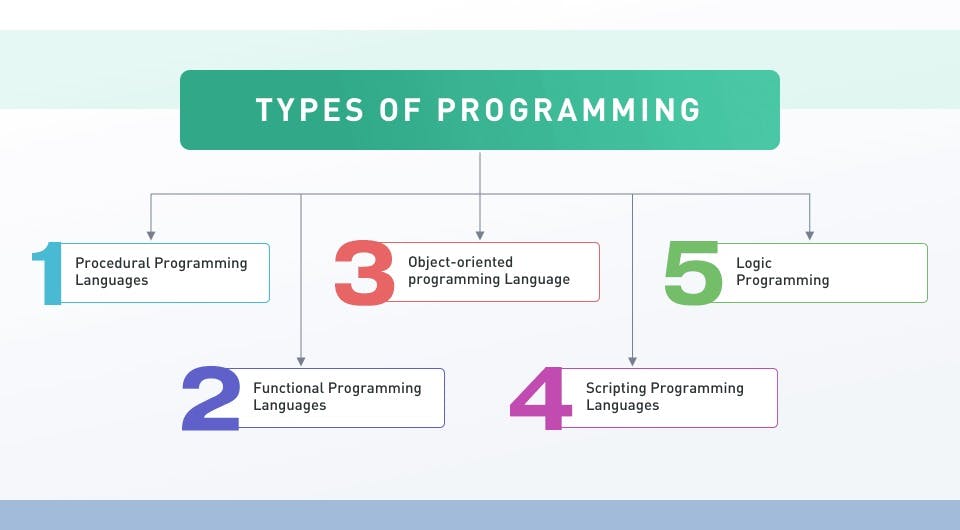Best Coding Languages for Beginners to Learn in 2022
A beginner's guide to finding the right coding language to start with.
There are a number of programming languages in the industry that you probably wouldn't be able to count on your fingertips. There's the classic C/C++, there's the nerdy Java, there's every developer's favorite Python, and there is also the underappreciated Ruby and Go.
But as a newbie how do you start your journey into the intriguing world of computing with so many languages to pick from? This is a million-dollar question that has intrigued developers for ages, unfortunately, the solution isn't as simple as it appears.
Deciding on your first programming language as a first-year student can be a fun process and also requires a lot of research, this article will hopefully help give you a better idea of which one you should pursue.
The Boom of Programming Languages
Knowing how to build a computer algorithm is one of the most crucial talents to have in today's society. Whether it be the autopilot on an airplane or the digital speedometer on your bike, technology has made its way into practically every sector. In today's world, computers are used in practically every customer experience. So, which programming skills should you learn first?
All things considered, programming and developer networks are developing at a quicker rate than at any other time. A few new programming languages and structures are springing up, appropriate for various classifications of developers (novices, halfway, and specialists) and various use cases (web application, portable applications, gaming, circulated framework, and so forth).
If you're thinking about improving your talents and moving into this in-demand field, you should be aware of the many types and degrees of programming, as well as the finest coding languages to study.
The Levels of Programming
There are various programming languages, each with its purpose and set of variables and syntactic structure for creating instructions. Programming languages are divided into two groups based on their different levels of abstraction:
- Low-level Language or LLL
- High-level Language or HLL
Types of Programming
Before we move to well-known programming languages, we ought to have an overall comprehension of the various sorts of programming languages. This is not the same as the degrees of programming dialects - programming language types allude to how the code is utilized and planned, rather than where it sits on the machine-gathering human order.

To begin, set away all of the newish languages like Rust, Swift, and Julia. They may appear enticing at first look, especially given their interesting names, but they are not suggested for beginners. Why’s that? It's not just because these languages are complicated or confusing. No. The motivation behind why they are not suggested for a fledgling is a direct result of two reasons:
Finding resources to study these skills is quite difficult. There won't be an online learning platform or a thick booklet to teach you, Swift or Julia. No. The resources are either non-existent or insignificant.
They are not as common as other coding languages, which implies they are used for a quite specific reason (at least at this point), and you will not learn as much because there will be few opportunities to put your abilities to the test. You can always go back to learn it if you need to.
We're left with C/C++, Java, or Python as plausible and realistic possibilities. Sorry, but HTML isn't considered general-purpose programming. Let's have a look at it in more detail. Perhaps you studied one of these coding languages in your high school, but it makes no difference. Let's be honest about this. Coding is not taught in schools in the most effective way possible.
Best Programming Languages
1. Python
Difficulty level: Easy to learn. One of the most beginner-friendly computer languages.
Career prospects: The highest number of job postings and a high average income.
Pros:
- Due to the general properties of OOP, creating and utilizing classes and objects is simple
- Large-Scale library support
- Focuses on code readability
- Has the ability to scale even the most complex applications
- Ideal for quickly developing a prototype and putting ideas to the test
- Open-source software with a burgeoning community of users
- Easy to learn and utilize.
Cons:
- Not suitable for mobile computing
- Slower by virtue because its an interpreted coding language
- The database access layer is somewhat immature
- Threading isn't recommended due to GIL (Global Interpreter Lock)
2. Java
Difficulty level: Easy to moderate
Career prospects: It's great since it's used by a lot of big companies.
Pros:
- An abundance of open-source libraries
- Automatic memory allocation and garbage collection
- Follows the OOP paradigm
- Has the stack allocation system
- A high degree of platform independence thanks to the JVM feature
- Highly secure due to the exclusion of explicit pointer and inclusion of a security manager responsible for defining the access of classes
- Ideal for distributed computing
- Offers a galore of APIs for accomplishing different tasks, such as database connection, networking, utilities, and XML parsing
- Supports multithreading
Cons:
- Absence of templates limits creating high-quality data structures
- Expensive memory management
- Slower than natively compiled programming languages, like C and C++
3. C/C++
Difficulty level: Easy to moderate to learn
Career prospects: Good, though it is not the most common among job openings and internships.
Pros:
- Several compilers and libraries to work with [C++]
- Eases accessing blocked or hidden objects by other coding languages [C]
- Faster execution of programs than most languages [C/C++]
- Basics for understanding more complicated languages [C/C++]
- Language of choice for multi-device, multi-platform app development [C++]
- Offers a great degree of portability [C]
- A procedural language has a collection of function modules and blocks. These make it easier to debug, test, and update the applications. [C].
- Programs are more effective and simple to comprehend. [C/C++]
- Rich function library [C++]
- It offers a low level of abstraction [C/C++]
- Support both exception handling as well as function overloading [C++]
- Games, GUI applications, and real-time statistical models are just a few of the application fields.[C++]
Cons:
- Complex syntax [C/C++]
- Doesn’t support program namespace [C]
- Incapable of solving modern, real-world programming challenges [C]
- Less efficient object-oriented system compared to other OOP-based programming languages [C++]
- Need to manually create the high-level constructs [C]
- No garbage collection or dynamic memory allocation [C/C++]
- No run-time checking [C/C++]
- No strict type checking [C]
- Not an easy first-choice for learning programming [C/C++]
- Plagued by the issues of buffer overflow and memory corruption [C/C++]
- Smaller standard library [C]
4. JavaScript
Difficulty level: Easy
Career prospects: Excellent, as several startups use it
Pros:
- Client-side JavaScript is a lightning-fast scripting language. There is no need to compile it because it runs right away in the browsers.
- Makes a website’s interface richer
- Highly versatile
- Acts as the “programming language of the web”
- Because it's client-side, there's less load on the website server.
- Regular updates via the ECMA specification
- Several add-ons, such as Greasemonkey, for extending functionality
- Simple implementation
- Plenty of resources and excellent community support
- Used for building a diverse range of applications
Cons:
- Absence of copy or equivalent method
- Allows only single inheritance
- Due to the fact that the code is executed on the user's PC, many individuals opt to deactivate JavaScript for fear of being abused for harmful purposes.
- Different Web browsers may interpret it differently.
6. R
Difficulty level: Easy to moderate
Career prospects: Excellent
Pros:
- The ability to function in a smooth manner on a variety of operational systems
- An active, growing community
- Because it is open-source and free, it is possible to make changes as needed.
- Comprehensive statistical analysis language
- Highly extensible
- Powerful package ecosystem
Cons:
- Lacks security features
- No strict programming guidelines
- Poor memory management
- The quality of some packages is subpar
7. Swift Apple Inc. created this powerful programming language. It's used to make apps for iOS, watchOS, macOS, and a variety of other platforms. It's the way elevated and secure apps will be in the future. As a result, it will rise to the top of programming languages sooner rather than later.
It offers some amazing features like:
- Easy to understand and maintain.
- Speeds development process.
- Enhanced performance.
- Supports dynamic libraries.
- Companies working on Swift are Apple, Instagram, Uber, Slack.
CONCLUSION
Your decision of which programming language to learn will rely upon your professional objectives.
- For instance, to plunge into Machine learning and Deep learning, then, at that point, you shouldn't invest your energy learning Java or C#.
- Python and JavaScript, two of the most well-known programming languages, are hot in the startup world. Numerous new companies use Django (Python), Flask (Python), and NodeJS (JavaScript) as their backend frameworks. These are both simple-to-learn and in this way viewed as the best programming languages to learn for newbies. In addition, there are a few open doors on the lookout for these jobs.
- In the business realm, Java and PHP are widely utilized. Many firms utilize Spring java and PHP as their web backend frameworks.
- In the realm of data analytics, R and MATLAB are widely used. To foster a vocation in data analytics or information science, these are the dialects to learn. C/C++ and Golang are the top decisions in building low-inertness and versatile frameworks.
So, here's the gist of it. Determine which area you fall into and get started on your path to becoming a great programmer. Whatever language you choose, persist with it and don't give up in the middle. Give it your time and attention, and it will reward you with success.
Bonus Tip: Explore New Things in Your First Year
Are you aware that the IT sector is divided into several subfields? So, during your first year of college, you should try a lot of different knowledge to figure out what subject you're really passionate about. There are several domains, including cyber security, blockchain, and so on. So, don't forget to learn about all of these disciplines in order to choose the one that is right for you!

